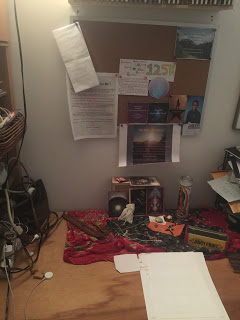I am Michelle Thompson and This is How I Work
 Today, I am interviewing Michelle Thompson for the “How I Work” series. Michelle Dionne Thompson coaches women writers, academics, and lawyers to implement their biggest visions for their lives and society. You can find out more about her at http://michelledionnethompson.com
Today, I am interviewing Michelle Thompson for the “How I Work” series. Michelle Dionne Thompson coaches women writers, academics, and lawyers to implement their biggest visions for their lives and society. You can find out more about her at http://michelledionnethompson.com
Current job: Coach, Writer, and Professor
Current location: New York City, NY, USA
Current mobile device: Apple iPhone
Current computer: Apple MacBook Pro
Can you briefly explain your current situation and research to us?
I wear many hats. I teach part time at City College of New York where I teach a Caribbean/Brazilian history survey course, a survey course of the History of the African Diaspora and Women in the African Diaspora. I am converting my dissertation into a monograph for publication. Finally, and the hat that takes up most of the room in the closet, I am the Founder and CEO of Michelle Dionne Thompson Coaching and Consulting where I work with women nonfiction writers and lawyers to take their writings/individual case work and convert it to the social change they really dream of.
For my monograph, I focus on the descendants of a runaway slave community in Jamaica called Maroons after slavery ended in the nineteenth century. Jamaica tried to get rid of the communities and failed miserably. The Maroons’ ability to retool the methods of resistance they used were central in preserving the community they built starting in the seventeenth century.
What tools, apps and software are essential to your workflow?
Evernote is so important to me. When I get ideas, when I need a template to answer emails, or any number of other thoughts, I turn to Evernote. Asana helps me keep track of tasks with deadlines. While I have not sorted out how to use Streak’s pipelines, I LOVE setting up emails in advance and Streak sending them when I tell it.
Then there are the anti-distraction tools. I am a big fan of http://selfcontrolapp.com that prevents me from using social media and email while writing (you can tell it what websites to block) and Forest. Forest functions both as a timer and prevents me from using my cell phone while writing by growing a tree when I’m on the timer. If I use my phone, the tree stops growing. You earn coins that allows you to grow a real tree once you’ve earned enough.
What does your workspace setup look like?
I work in my son’s room (before he was born, it was my office) and sometimes different coffee shops. I have a desk there that has a vision board and an altar so I can have a constant reminder of what I’m trying to do and what my values are. The altar has a candle so that I can stay grounded when things are going well and when things get hard. The altar also serves as a way of keeping me on my path.
What is your best advice for productive academic work?
Do a little bit daily. I, personally, would never write anything if I waited for a day to write. Further, my mind is mush after two hours and the following day I don’t write as well. It’s better for me to work anywhere from 45 minutes to one and a half hours daily.
How do you keep an overview of projects and tasks?
I use Asana to do that. It has projects (each article I’m working on, the book proposal, etc.) and then the respective tasks that need to be finished along with deadlines.
Besides phone and computer, do you use other technological tools in work and daily life?
If this isn’t redundant, I use a tablet. It’s funny, my partner prints papers to read and edit. I can’t stand having all of that PAPER everywhere. I download the papers onto my tablet and I have the feel of editing on paper because it’s the right size. I also have an Apple watch. Reminders get sent to it and I use the timer functions.
Which skill makes you stand out as an academic?
I’m not sure I would say skill or characteristic. I am headstrong. Perhaps I should say bull headed. This translates into being persistent and consistent. While I get devastated with feedback from academic journals, I take the advice and do it anyway. And when I get more feedback, I incorporate that. Wendy Laura Belcher, in her book How to Write a Journal Article in Twelve Weeks, writes about the importance of being persistent when you are trying to publish in academic publications.
What do you listen to when you work?
Nothing if I am at home. If I’m in a coffee shop, the music proves too distracting, so I actually have an app of binaural beats that is supposed to facilitate concentration (actually it does).
What are you currently reading? How do you find time for reading?
I have three books that I’m currently reading. When it’s Sunday (my day of complete rest), I am reading Anne Lamot’s Traveling Mercies. For self-improvement, I am reading Valerie Young’s The Secret Thoughts of Successful Women, a book that delves deeply into imposter syndrome. I tend to read this when I am commuting to and from teaching if I don’t feel too brain dead. Academically, I am reading Abigail Bakan’s Ideology and Class Conflict in Jamaica. I do need to carve out more time for academic reading, but I insert this reading into my writing time as it is connected to my journal article that I am revising.
Are you more of an introvert or extrovert? How does this influence your working habits?
I actually think I’m a little bit of both. I can rise to the occasion and meet with people. I know how to work a room and can take a little bit of energy from that. However, if I don’t plan how to do it, I easily feel overwhelmed and withdraw. And after I have these connections, I need time by myself… or time to stare at a screen because when you have a child and partner, you can’t completely withdraw.
This has meant that I have been setting up coffee dates with people to discuss both my academic and business-related work. It has taken me YEARS to get to the point where I will do that. It is paying off. To make sure that I am not always writing by myself, I run a couple of Meetups for academic writers and lawyers, and I do enjoy being with them. We have some contact, but it’s not a completely social setup.
However, what I like the most is staying at home writing, planning, and posting on social media for work-related reasons. I find that to be much less draining.
What’s your sleep routine like?
As much as I value sleep, it’s a work in process. I’m doing well when I am on a streak of 7 – 8 hour nights. Often, however, I find myself getting closer to 6 hours of sleep. Since the current resident of the White House was elected in the United States, it’s really thrown a wrench in my sleep routine. I can’t resist the news. There was a period immediately following the election where I just avoided the news. While I hoped that my sleep would improve, I was too scared to sleep well.
In order to fall and stay asleep, I often use the practice of gratitude and deep breathing. That also helps if I wake up in the middle of the night.
This may be too much information, but perimenopause negatively impacts my ability to sleep as much as I would like. There are times when I am wide awake and there’s nothing I can do about it.
What’s your work routine like?
Every Sunday evening, I take time to write a list of what I want to accomplish during the upcoming week and then I take that list and put what parts of the work will get done on a given day and time in my calendar. That way, during the week, I don’t spend time wondering what I should be doing.
Generally, every weekday morning I wake up at 5 a.m. I watch the video Darren Hardy sends out and then I write until my son wakes up. At that point, although he does most of the work, I help get him out of the door while walking the dog. If I’m not teaching on that day, I do yoga and meditate so that my mind can quiet down and I can focus for the rest of the day (I find that this greatly helps my ability to sleep). I pick up work again around 9 or 10 when I devote time to my business or I teach. The afternoon is also spent on my business or teaching, depending on my schedule. I read when I’m commuting. I aim to finish my workday by 5 p.m. Generally, I succeed.
What’s the best advice you ever received?
I think it was my Mom who always said that “Rome wasn’t built in a day.” I have a new appreciation of what that means now that I have such huge projects that compete for my time and attention. You have to break the big projects down into little pieces and do a little piece every day.

